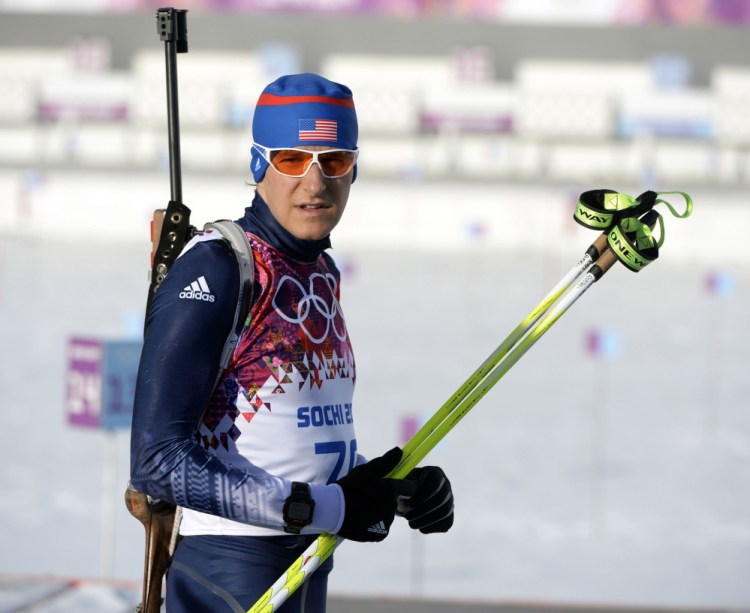Russell Currier is on the brink of his second Winter Olympics.
Currier, 30, grew up in the Aroostook County town of Stockholm and competed in biathlon in the 2014 Sochi Games. He is currently in Europe, battling for one of two remaining slots on the U.S. men’s biathlon team scheduled to compete in Pyeongchang, South Korea, next month.
Cape Elizabeth native Clare Egan qualified for the U.S. women’s biathlon team last month. Currier has two possible avenues to join Egan in South Korea.
The first is to perform the best of four U.S. men competing in two International Biathlon Union events this month, in Slovakia and Germany. Only the top two scores count, and in a pair of 10-kilometer sprints in Slovakia over the weekend, Currier placed 14th and 27th overall, but first and second among Americans.
On his personal blog, Currier wrote: “Optimism is still intact. More races to go. This is me still alive and fighting.”
The remaining two races consist of a 15K individual time trial on Tuesday (involving only the U.S. team) and an IBU Cup 10K sprint on Saturday, both in Arber, Germany.
Lowell Bailey, Tim Burke and Sean Doherty are already on the five-man U.S. team and are currently competing on the World Cup circuit, along with Egan and U.S. Olympian Susan Dunklee.
Max Cobb, president and CEO of the U.S. Biathlon Association, said Tuesday’s time trial is to help determine which U.S. biathletes should be sent to a World Cup event in nearby Ruhpolding, a three-hour drive from Arber, so the United States can field a full men’s relay on Friday and a full women’s relay on Saturday.
“It’s a total discretionary pick on who to bring up for the relay,” Cobb said by phone from his home in Vermont. “Theoretically, they could pick someone to race the relay and (he or she) not end up on the (Olympic) team, although I think that’s highly unlikely.”
The U.S. will send five men and five women to the Olympics for biathlon, with the first four qualifying in accordance with specific criteria and the fifth via a discretionary selection from a five-member panel that does not include Cobb.
The three men competing with Currier for the final berths are fellow Sochi Olympian Leif Nordgren of Minnesota, Paul Schommer of Wisconsin and Jakob Ellingson of Minnesota. In the fairly complicated percentage-back formula used to determine rankings, Nordgren has a slight edge on Currier through two races, 198.1 to 198.3, with Schommer third at 202.3 and Ellingson fourth at 208.1.
No matter which biathlete heads to Ruhpolding for the World Cup relay, all four are scheduled to race in Saturday’s sprint in Arber.
“We were impressed with his performance at the trials in Minnesota,” Cobb said of Currier, who won two of four races in December at the U.S. national trials to earn his spot in the IBU circuit, “and then he had two good races at the IBU Cup. His skiing is terrific – that’s nothing new – and his shooting has been much more consistent that it has been for the past several seasons, in a good way.”
The four women competing for three available berths on the U.S. Olympic team are Joanne Reid of California, Emily Dreissigacker of Vermont, Maddie Phaneuf of New York and Chloe Levins of Vermont. After two races, according to the percentage-back formula, Reid leads with 195.4, followed by Dreissigacker at 199.8, Phaneuf at 206.7 and Levins at 210.7.
Eleven biathlon events are planned for Pyeongchang, beginning Feb. 10. There will be five men’s races, five women’s races and one mixed relay.
Before flying from Bangor to Europe on New Year’s Day, Currier wrote about the difficulties of training in the extended sub-zero temperatures of Maine this winter and noted that he never makes promises for results, “but all things considered, I’ll cough up blood to make the results happen if need be.”
Glenn Jordan can be contacted at 791-6425 or:
Twitter: GlennJordanPPH
Send questions/comments to the editors.



